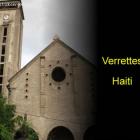ADVERTISEMENT
Education - Haiti Observer Blog
Education, Haiti Observer Blog. Read the following articles about Education
Education represents major challenge for Haiti, but also the solutions to poverty
Principal of Santo's SOS School, Charles Myrtil, has expressed his belief that the state should provide education and build schools for the nation's children as a rule, regardless of which administration is in power. As the head of a school that has been instrumental in providing education, food and other necessities to children and their families in the poor regions (especially with the work they did following the 2010 earthquake), he is one who understands that one of the country's greatest problems, education, can also be its most viable solution out of poverty.
Almost half of the country of Haiti (approximately 5 million people) are under 18 years of age. The numbers of those living in poverty in the country are well known, so when 80% of schools are private, millions are left behind without the key ingredient to make their lives better. A cycle exists where poorer children are forever unable to bridge the educational, and therefore, social gap between them and those who can pay for educations. As such, illiteracy is rampant, and potentially brilliant minds, who could lift the country out of its mire, never have the chance to realize their abilities. Schools have been build to facilitate poorer students across the island, and programs, such as those offering meals, play a hand in helping to fix this problem. However, there are still children who, to receive their education on a daily basis, need to walk to school every day distances of 15 and even 20 kms.
New salary scale for Haitian teachers proposed
In an effort to improve teacher's working conditions in the public sector of education and to strengthen the education system, the Ministry of National Education and Vocational Training (MENFP) has developed new salary scale.
Based on qualification, the educational staff is grouped into three cactegries:
Salary scale:
Teachers with an educational level of the 3rd cycle of basic education will receive from 13,000 to 14.333 Gourdes.
Teachers graduated from "École Normale d'instituteur will have a starting salary of 20,000 gourdes and can go all the way to 29.282 gourdes.
Teachers with a bac +3 + (CAPED), the salary will be between 21,038 and 40,132 Gdes Gdes
Quality Education for Haiti to be Modeled on Finnish System
One of the most crucial elements to building and sustaining a healthy economy in Haiti is a developed education system. Recently the governments of Haiti and Finland have partnered up to address solutions to the problem of adequately educating the Haitian populace.
Minister of Education, Nesmy Manigat, and his equivalent Krista Kiuru of Finland signed a cooperation agreement that includes, among other considerations, teacher training and curriculum reform. The signing occurred at an international conference on the quality of education in the presence of Deputy Director Ecclesiaste Telemaque and Quisqueya University Rector Jacky Lumarque, as well as other Finnish educators and senior ministerial officials from both countries.
Little Haiti book fair Sponsored by the Mapou Cultural Center
Over the weekend of September 13-14, 2014, Residents of South Florida were treated to a spectacular showcase of Haitian and Caribbean art, history and literature at the staging of two events. With the aim of coming to learn more about the pervasive Haitian culture, guests were invited to attend these free events and witness the displays of not just what Haiti has to offer culturally, but the Caribbean as well.
The back-to-back events were sponsored by Mapou Cultural Center, run by owner of the Haitian book store Libreri Mapou, Jan Mapou. They were, on Saturday, from 6:00 to 9:00 in the evening, a cocktail party held at the Little Haiti Cultural Center, and, on Sunday, from 10:00 in the morning until 6:00 in the evening, a book fair which was also sponsored by the Knight Foundation. The first event featured musical items from various singers as well as a Haitian folk choir, while the second event featured appearances by famous Haitian author Gary Victor and Haitian-American author Edwidge Danticat.
The Digicel Foundation recently opened its 150th school in Haiti
The Digicel Foundation recently opened its 150th school in Haiti Loads of sunshine and beautiful colors, a pleasant accompaniment to the smiles of the children of the newly opened school, Ecole Nationale de Grande Savane, in Haiti. The smiles were made possible by the Digicel Foundation, which has opened 150 schools in the country since the beginning of their construction plan in 2007, putting such smiles on scores of faces. At the opening of the school, chairman of the Digicel company and its patron, Denis O'Brien, spoke about the 50,000 children who have been enrolled in the 150 schools under the safety of learning-conducive facilities and hurricane and earthquake safety. Apart from the numbers being supplied with an education through the $30 million USD scheme, there was the employment of over 10,000 people for the construction of the buildings within the project.
Most Haitians speak Haitian Creole but traditional language of education is French
Creole Gaining Acceptance in Classrooms
While French may be the official language of Haiti, Creole is what is spoken by over 90% of its citizens. However French is the language used to teach in nearly every Haitian classroom, yet instructors don't speak or write it fluently. Creole and French vocabularies and syntaxes differ to the point they are almost unrecognizable. People ask why continue an education system using a language uncomfortable to teach and learn in?
Haitian Creole is perceived as an inferior offshoot of French and its speakers as having no fluency in French, when in fact they are speaking Creole. For students, not being able to master French means not being able to do well in their studies.
Minister of Education takes over control of some schools, declaring State of Emergency
The Minister of Education in Haiti has decided to take control over the administration of several schools that have been performing poorly while demanding that the Directors leave for a period of time to receive appropriate training.
According to Minister Nesmy Manigat, the academic staff at these institutions will have to participate in a training session for a period of at least 9 weeks, while their institution are under the control of the Ministry.
Here is a list of the schools that have been taken over by the Minister of Education under State of Emergency:
Nesmy Manigat, Minister of National Education & Vocational Training
On Thursday April 3, 2014, Mr. Nesmy Manigat who is a professor and member of the Bipartite Commission of negotiation and Advisor to the Prime Minister Laurent Lamothe, has been installed as the Minister of National Education and Vocational Training in place of outgoing Minister Vanneur Pierre. Vanneur Pierre congratulated his successor, the new minister in the presence of the Prime Minister and other senior officers and employees of the Ministry. The outgoing minister welcomed his successor and expressed his belief that professor Manigat's knowledge, experience and understanding of the Haitian economy and social reality will help him immensely to fulfill his challenges ahead.
Lycee Jean-Baptiste Pointe Du Sable Of St-Marc
On May 17, 2014, President Michel Martelly, in the company of the First Lady, Sophia Martelly, and Altes Toussaint, the Deputy of St-Marc, participated in the inauguration of Lycee Jean-Baptiste Pointe du Sable of St-Marc, which is an educational institution that the Haitian government has decentralized to provide free education. The institution will mostly serve disadvantaged people and has space for up to 720 students.
The new institution will admit students from kindergarten all the way to terminale. The institution has a library, music, computer labs, basketball and volleyball courts, football field, and a 400-meter running track with six lanes. The Hand In Hand Foundation sent some of its members to the inauguration ceremony. The Head of State welcomed the new institution and says that its model will be replicated throughout Haiti.
Martelly Delivers Speech on Education System Challenges
A discourse is taking place within the government of Haiti (GOH) concerning the quality of education. President Martelly recently spoke to a delegation of educators about the underdevelopment of Haiti's education system. His speech was delivered at the Royal Oasis Hotel with Minister of National Education and Vocational Training, Nesmy Manigat, present. It was the occasion of the National Assizes on the Quality of Education Conference.
Martelly dragged out old platitudes, ". . . that . . . education . . . will improve the economic and social conditions of the population." Martelly also used a new buzz word, "inclusion", to urge its application ". . . from kindergarten to university . . ." He added the way out of poverty is ". . . for all children to have a solid education." He called upon his government to commit to teacher training, more school textbooks, school construction and maintenance, and school lunch programs.
Our objective is to share with you news and information about Haiti and the people of Haiti. Traditions, habits and the way we were or grew are alive in this site. We highly recommend that you Subscribe to our Newsletter and also share with us some of the things that are memorable and made us unique people.

 Verrettes, Haiti
Verrettes, Haiti  Haiti tech Summit
Haiti tech Summit  Informative Marketing and Advertising in the Haitian Community
Informative Marketing and Advertising in the Haitian Community  The Town of Savanette, Haiti
The Town of Savanette, Haiti  Something to think about
Something to think about